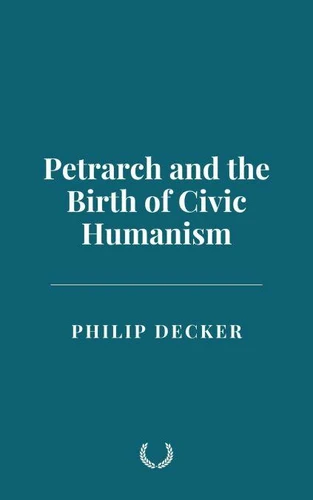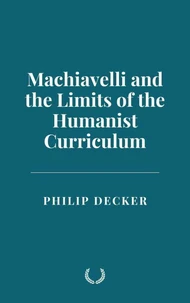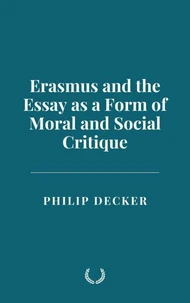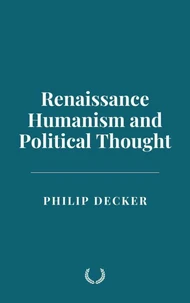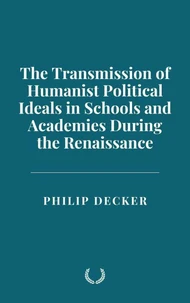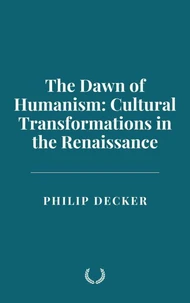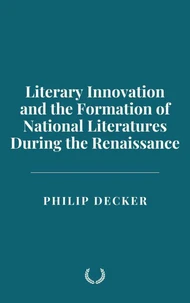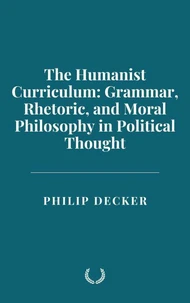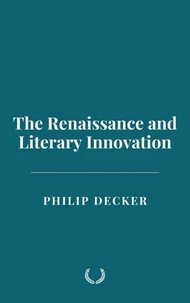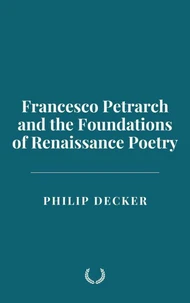Petrarch and the Birth of Civic Humanism
Par :Formats :
Disponible dans votre compte client Decitre ou Furet du Nord dès validation de votre commande. Le format ePub est :
- Compatible avec une lecture sur My Vivlio (smartphone, tablette, ordinateur)
- Compatible avec une lecture sur liseuses Vivlio
- Pour les liseuses autres que Vivlio, vous devez utiliser le logiciel Adobe Digital Edition. Non compatible avec la lecture sur les liseuses Kindle, Remarkable et Sony
 , qui est-ce ?
, qui est-ce ?Notre partenaire de plateforme de lecture numérique où vous retrouverez l'ensemble de vos ebooks gratuitement
Pour en savoir plus sur nos ebooks, consultez notre aide en ligne ici
- FormatePub
- ISBN8231913183
- EAN9798231913183
- Date de parution22/06/2025
- Protection num.pas de protection
- Infos supplémentairesepub
- ÉditeurWalzone Press
Résumé
Petrarch and the Birth of Civic Humanism offers a groundbreaking exploration of how one man's revival of classical antiquity reshaped the very foundations of Western political and moral thought. Francesco Petrarch, often hailed as the "Father of Humanism, " pioneered a revolutionary vision that fused the dignity of the individual with a profound sense of public duty-a synthesis that gave birth to civic humanism, the ethical backbone of the Renaissance and a lasting influence on modern democracy.
Set against the turbulent backdrop of fourteenth-century Italy-a land fractured by factional strife, papal intrigue, and the waning power of medieval institutions-this meticulously researched and vividly narrated book traces Petrarch's life, his rediscovery of ancient texts, and his impassioned call for virtuous leadership and engaged citizenship. Drawing on Petrarch's poetry, letters, and philosophical dialogues, the book reveals how his ideas transcended personal reflection to inspire a cultural movement dedicated to the renewal of republican values through education, eloquence, and moral integrity.
More than a biography, this work illuminates the evolution of civic humanism from Petrarch's intimate meditation on selfhood and virtue to a collective political ethos that transformed city-states like Florence and Venice. It examines the profound influence Petrarch wielded on his humanist successors-Coluccio Salutati, Leonardo Bruni, and beyond-and how his ideals spread throughout Europe, shaping the intellectual climate that paved the way for the modern notion of citizenship.
Combining rigorous scholarship with accessible prose, Petrarch and the Birth of Civic Humanism offers readers an inspiring journey into the origins of humanist thought and its enduring relevance today. Whether you are a student of history, philosophy, or political theory, or simply fascinated by the timeless questions of how individuals contribute to the common good, this book presents a masterful portrait of a visionary who redefined the relationship between self and society, leaving an indelible mark on Western civilization.
Set against the turbulent backdrop of fourteenth-century Italy-a land fractured by factional strife, papal intrigue, and the waning power of medieval institutions-this meticulously researched and vividly narrated book traces Petrarch's life, his rediscovery of ancient texts, and his impassioned call for virtuous leadership and engaged citizenship. Drawing on Petrarch's poetry, letters, and philosophical dialogues, the book reveals how his ideas transcended personal reflection to inspire a cultural movement dedicated to the renewal of republican values through education, eloquence, and moral integrity.
More than a biography, this work illuminates the evolution of civic humanism from Petrarch's intimate meditation on selfhood and virtue to a collective political ethos that transformed city-states like Florence and Venice. It examines the profound influence Petrarch wielded on his humanist successors-Coluccio Salutati, Leonardo Bruni, and beyond-and how his ideals spread throughout Europe, shaping the intellectual climate that paved the way for the modern notion of citizenship.
Combining rigorous scholarship with accessible prose, Petrarch and the Birth of Civic Humanism offers readers an inspiring journey into the origins of humanist thought and its enduring relevance today. Whether you are a student of history, philosophy, or political theory, or simply fascinated by the timeless questions of how individuals contribute to the common good, this book presents a masterful portrait of a visionary who redefined the relationship between self and society, leaving an indelible mark on Western civilization.
Petrarch and the Birth of Civic Humanism offers a groundbreaking exploration of how one man's revival of classical antiquity reshaped the very foundations of Western political and moral thought. Francesco Petrarch, often hailed as the "Father of Humanism, " pioneered a revolutionary vision that fused the dignity of the individual with a profound sense of public duty-a synthesis that gave birth to civic humanism, the ethical backbone of the Renaissance and a lasting influence on modern democracy.
Set against the turbulent backdrop of fourteenth-century Italy-a land fractured by factional strife, papal intrigue, and the waning power of medieval institutions-this meticulously researched and vividly narrated book traces Petrarch's life, his rediscovery of ancient texts, and his impassioned call for virtuous leadership and engaged citizenship. Drawing on Petrarch's poetry, letters, and philosophical dialogues, the book reveals how his ideas transcended personal reflection to inspire a cultural movement dedicated to the renewal of republican values through education, eloquence, and moral integrity.
More than a biography, this work illuminates the evolution of civic humanism from Petrarch's intimate meditation on selfhood and virtue to a collective political ethos that transformed city-states like Florence and Venice. It examines the profound influence Petrarch wielded on his humanist successors-Coluccio Salutati, Leonardo Bruni, and beyond-and how his ideals spread throughout Europe, shaping the intellectual climate that paved the way for the modern notion of citizenship.
Combining rigorous scholarship with accessible prose, Petrarch and the Birth of Civic Humanism offers readers an inspiring journey into the origins of humanist thought and its enduring relevance today. Whether you are a student of history, philosophy, or political theory, or simply fascinated by the timeless questions of how individuals contribute to the common good, this book presents a masterful portrait of a visionary who redefined the relationship between self and society, leaving an indelible mark on Western civilization.
Set against the turbulent backdrop of fourteenth-century Italy-a land fractured by factional strife, papal intrigue, and the waning power of medieval institutions-this meticulously researched and vividly narrated book traces Petrarch's life, his rediscovery of ancient texts, and his impassioned call for virtuous leadership and engaged citizenship. Drawing on Petrarch's poetry, letters, and philosophical dialogues, the book reveals how his ideas transcended personal reflection to inspire a cultural movement dedicated to the renewal of republican values through education, eloquence, and moral integrity.
More than a biography, this work illuminates the evolution of civic humanism from Petrarch's intimate meditation on selfhood and virtue to a collective political ethos that transformed city-states like Florence and Venice. It examines the profound influence Petrarch wielded on his humanist successors-Coluccio Salutati, Leonardo Bruni, and beyond-and how his ideals spread throughout Europe, shaping the intellectual climate that paved the way for the modern notion of citizenship.
Combining rigorous scholarship with accessible prose, Petrarch and the Birth of Civic Humanism offers readers an inspiring journey into the origins of humanist thought and its enduring relevance today. Whether you are a student of history, philosophy, or political theory, or simply fascinated by the timeless questions of how individuals contribute to the common good, this book presents a masterful portrait of a visionary who redefined the relationship between self and society, leaving an indelible mark on Western civilization.

